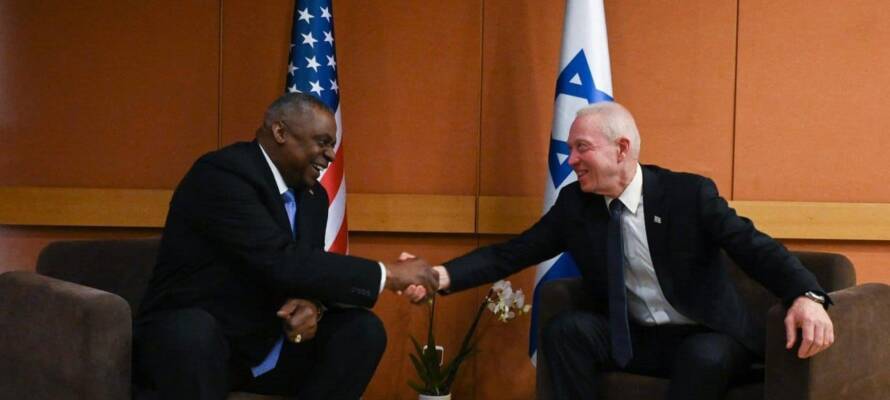Defense Secretary Lloyd Austin meets with top officials in Israel, including Netanyahu.
By JNS and United with Israel
“Iran remains the primary driver of instability in the region,” U.S. Defense Secretary Lloyd Austin said during a joint press conference with Defense Minister Yoav Gallant in Israel on Thursday.
Austin arrived in Israel for a one-day visit from Egypt as part of a Mideast tour that began in Jordan and also included an unannounced visit to Iraq.
He met with Israeli Prime Minister Benjamin Netanyahu, who flew to Rome following the meeting.
Austin said the U.S. remains “deeply concerned by Iran’s support for terrorism, its dangerous proxies, its nuclear advances, its aggression at sea, its cyber threats and its proliferation of attack drones and advanced conventional weapons.
“We continue to believe that diplomacy is the best way to prevent Iran from getting a nuclear weapon,” he said. “But as President [Joe] Biden has repeatedly made clear, the United States will not allow Iran to acquire a nuclear weapon.”
The defense secretary expressed concerns about Iran’s growing strategic partnership with Russia, which includes providing military drones for the latter’s war in Ukraine. “Iran is gaining important battlefield expertise and experience in Ukraine that will eventually transfer to its dangerous proxies in the Middle East,” he said.
Austin praised the growing defense cooperation between Israel and the U.S., particularly Israel’s shift in 2021 into the U.S. Central Command (CENTCOM)’s area of responsibility. “That change and the historic Abraham Accords have opened the door to even greater regional security cooperation. That means new opportunities to share early warning and to integrate air defense capabilities and to expand maritime domain awareness,” he said.
Following the meeting, Prime Minister Benjamin Netanyahu said that “of anyone in Tehran thinks that Iran can make unhindered progress toward nuclear weapons, they are mistaken.
“I discern a change in the approach to Iran in recent months, both in the US and in the countries of Western Europe, and in the West in general. I see a need and an obligation to try and strengthen a more assertive approach with Iran.
“Of course, this will be at the center of my meeting with the Italian prime minister just as it was at the center of my meeting with [French] President Macron. I intend to hold similar talks with principal European leaders in the near future.”
Defense Minister Yoav Gallant thanked Austin for his leadership in increasing U.S.-Israel defense ties, including with the recent joint IDF-CENTCOM Juniper Oak exercise. About 6,400 U.S. and 1,500 Israeli troops participated in that drill.
Gallant said the bond between the two countries takes on greater meaning given the Iranian threat. “Iran aims to gain nuclear weapons and threaten not only Israel but the entire world. Mr. Secretary, it is our duty to take all measures necessary to prevent Iran from gaining nuclear weapons.
“The Iranian nuclear threat requires us to be prepared for every course of action,” the defense minister added, saying that an Iran armed with nuclear weapons will increase its malicious activities in the region.
“Mr. Secretary, as the son of Holocaust survivors, I am fully aware of the heavy mission that rests on my shoulders, on our shoulders. We must do everything in our power to ensure that the dreams of the ayatollahs are never fulfilled at any cost,” Gallant said.
